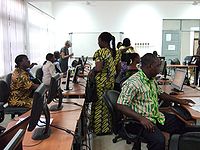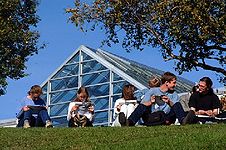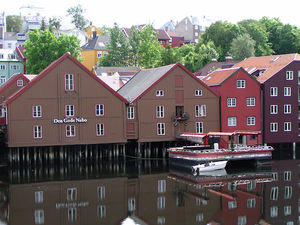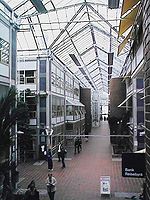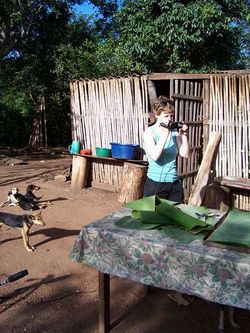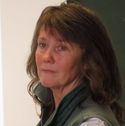2nd Trondheim Workshop in Language Description and Documentation
September 10th - 13th, 2012
'
© Dorothee Beermann
The focus of this year's workshop is Grammar Writing and Tools. We will have a special lecture on Linguistic Anthropology.
Contents
REFERENCE LIST
A list of references you find here
WORKSHOP PROGRAM
| September 10th-13th | Monday | Tuesday | Wednesday | Thursday |
| 9:30-12:00
|
9:30 - 10:00 arrival and coffee 10:00-10:10 Opening of the Workshop by the Pro-Dean for the Humanities Bjørn Myskja 10:10 - 12:00 Documentary and Descriptive Linguistics Ulrike Mosel and Dorothee Beermann room: Dragvoll,D12,building 10 |
9:30 - 12:00
Grammar Writing Ulrike Mosel |
9:30-12:00
Tools for linguists - Paunaka Documentation Project
room:Dragvoll, Building 4, level 5 LinLab
|
9:30-12:00
Grammar Writing Ulrike Mosel
|
| 13:15 - 15:30
|
ELAN
room: Dragvoll,Låven, D145 |
Linguistic Anthropology
Ingjerd Hoëm room: Dragvoll, Låven, D146 |
Annotations Dorothee Beermann's presentation room: Dragvoll,Låven, D145 |
Round Table
Research infrastructures and Language Documentation Including guest participant University of Bergen, coordinator of CLARINO |
| 17:15-19:00 | Round Table
Language Documentation in Scandinavia What can we learn from earlier experiences? Participants, including Florian Siegl, Finno-Ugrian and Scandinavian Studies, Helsinki Signe Rix Berthelin, NTNU, Trondheim Kenneth M. Bodua, NTNU, Trondheim room: Dragvoll, Building 4, level 5 LinLab |
Hands-on
ELAN & TypeCraft Han Sloetjes, Dorothee Beermann Computer room: 10345 |
Hands-on
ELAN & TypeCraft Han Sloetjes, Dorothee Beermann Computer room: 10345 |
Sponsored Workshop Dinner |
REGISTRATION
The participation in the workshop is free. We nevertheless would like to ask you to register in time.
Please send a registration e-mail to: REGISTER in which you state your name and your affiliation. Please let us know if you have special needs.
GRANTS - Sorry, the deadline has passed
If you are a student and wish to attend the workshop, and your institution cannot (or can only partially) cover your travel costs, you may apply for a travel grant of NOK 1500 to help you to cover travel expenses within Scandinavia. We can subsidize a maximum 5 participants.
In order to apply for a grant, you will need to supply your name and address as well as the name of your academic institution and some information about the study program that you follow. Please send your details to the following e-mail address:
Email: email us
VENUE
Reaching Trondheim from the airport
After arrival in Trondheim you will find an airport bus called 'flybuss', waiting in front of the terminal building. All flights are connected to airport buses that will take you directly to Trondheim where they stop at several central locations.
The prize of the bus ticket is NOK 120,00.
For those booked in a hotel, please follow the announcements in the bus.
For those booked in the Youth Hostel, please ask the driver to stop at Lademoen kirke ( Lademoen church).
The google map under STUDENT ACCOMMODATION shows you how to get from the Lademoen-kirke bus stop to the Youth Hostel.
Meals and Workshop Dinner
Welcome Evening - Sunday 9th
We have reserved a table from 19:00 on for a welcome meeting at the pub Den Gode Nabo. The pub has the largest selection of beer in Trondheim and serves small meals in the Pizza-Hamburger category.
Hope to see you on Sunday for a welcome drink!
Conference Dinner
'
Also this years workshop dinner will take place at the Trondheim Festning.
Time: September 13th, 18:00.
Workshop location
The LDD workshop is located at Dragvoll the campus of the Humanities (Det humanistiske fakultet (HF)) and the Faculty of Samfunnsvitenskap and Teknologiledelse (SVT) of the Norwegian University of Science and Technology in Trondheim.
At the Dragvoll campus you find next to the University library also a book store, a kiosk with a post service, a Mensa, and a coffee shop.
Find workshop rooms
Dragvoll is a very busy place during the semester therefore we have to change room ever to often. Please consult the #WORKSHOP PROGRAM for the room numbers and their location.
During the workshop week, posters at Dragvoll will direct you to the workshop site.
Campus plan: media:DragvollCampus.pdf
MORE ABOUT THE LECTURES AND THE LECTURERS
Documentary and Descriptive Linguistics
Ulrike Mosel and Dorothee Beermann
What distinguishes the activities of documentary and descriptive linguists from those of other linguists? Why is it still important to stress the rights of the individuals and communities contributing to language documentation? What is the role of language documentation and descriptive linguistics in Scandinavia? How does our methodology differ from other fields of linguistics and what does Language Documentation and Description (LDD) contribute to linguistics and related fields?
The new fields of data driven linguistics have contributed substantially to the archiving of the World's endangered languages and to Digital Humanities with the standardization and exchange of linguistic research data. Language Documentation has in addition sparked a more general interest in data-driven linguistic inquiries.
LDD is world-wide a success. It facilitates new ways of interdisciplinary research between anthropologists, computational linguists and classical linguists, leading to new methodologies and new tools.
In our talk we will introduce the field, discuss its role in Scandinavia, and present some of the new activities connected to this vibrant field of inter-cultural and interdisciplinary research.
Grammar Writing
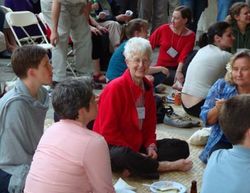
Download Ulrike Mosel's presentation
The first session on grammar writing starts with an introduction into the typology of grammars with respect to their purpose, content and structure, and then focuses on the role of grammaticography in language documentation, especially its interaction with the text recordings and lexicography.
In the second session we will discuss the methods of data collection, analysis and description. In particular, I will address the workflow of writing a grammar of a previously undescribed language and show how ELAN and the query language of Regular Expressions can be fruitfully employed in grammar writing.
ELAN
ELAN is an annotation tool for digital (or digitized) audio and video recordings. It is a generic annotation tool that is being used in several research areas.
The lecture consists of two parts:
A. A brief introduction to the tool and an overview of its main functionalities. (Presentation)
B. Practical training in working with the tool. A step-by-step approach will guide the user through the basic functions of ELAN, with an emphasis on features that are relevant for Language Documentation projects. (Hands-on)
Linguistic Antropology
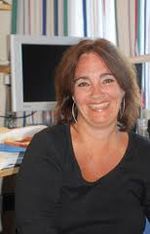
What defines Linguistic Anthropology as an area of research, and how is research within this field of relevance to linguistics and anthropology?
The first part of the lecture will discuss these questions, with a particular focus on theoretical approaches to the relationship between ‘discourse and context’.
The second part will use case studies in order to illustrate how we can identify so-called ‘contextualisation cues’ and what we can learn about communicative practices through them.
The lecture will include a practical demonstration of situational analysis as a brief introduction to fieldwork techniques.
Paunaka Documentation Project
The Praxis of Language Documentation in the Paunaka Documentation Project
During the last decades, Language Documentation has emerged as a new field in Linguistics. In connection, new tools such as Elan and TypeCraft have been developed and digital archives have been set up to guarantee long-term storage of data. Language Documentation has also increased the awareness of fieldwork ethics, speakers‘ rights and fieldworkers‘ responsibilities towards the language communities.
In this session, I will focus on the practical side of Language Documentation by giving insights into work in the Paunaka Documentation Project. How do we make use of the tools? What problems did we encounter? How are speakers‘ rights realized? How does a typical day in the field look like?
Much of my experience is specific to the fieldwork situation encountered with speakers of Paunaka and may not be transferrable to other fieldwork situations. It may nevertheless give students an idea how Language Documentation can look like.
Text Annotation
Download Dorothee Beermann's presentation
The processing of field data is one of the most important linguistic tasks. It lays the fundamentals for documentary linguistics and for data-driven linguistic description and analysis. We will start with a survey of a range of interlinear glossed texts, focusing on format and function of the annotations. We will discuss linguistic standards and their use in an incremental and explorative annotation process. We will also discuss the creation and maintenance of individual and collaborative research corpora using the online database TypeCraft.
Our lecture goes hand in hand with the practical training in the "Hands-on ELAN & TypeCraft" evening classes. Related to text annotation, we will give a brief introduction to the TypeCraft online Glosser and an overview of its main functionalities. Next to video and audio anntoation with ELAN presented by Han Sloetjes, we will demonstrate data migration between ELAN and TypeCraft.
The presentations will be followed by practical training in working with the tools. A step-by-step approach will guide the user through the basic functions of TypeCraft and ELAN with an emphasis on features that are relevant for Language Documentation projects and data-driven language description and analysis.

